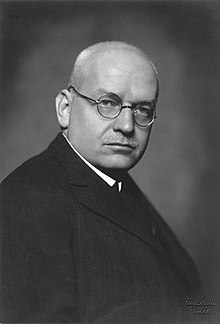Hans Luther
| Hans Luther | |
|---|---|
 |
|
|
Chancellor of Germany 9th Chancellor of the Weimar Republic |
|
|
In office 15 January 1925 – 12 May 1926 |
|
| Preceded by | Wilhelm Marx |
| Succeeded by | Wilhelm Marx |
| Personal details | |
| Born |
10 March 1879 Berlin, Prussia, German Empire |
| Died | 11 May 1962 (aged 83) Düsseldorf, West Germany |
| Political party | None |
| Profession | Lawyer, politician, diplomat |
| Religion | Lutheran |
Hans Luther (![]() listen ) (10 March 1879 – 11 May 1962) was a German politician and Chancellor of Germany for 482 days in 1925 to 1926. As Minister of Finance he helped stabilize the Mark during the hyperinflation of 1923. From 1930 to 1933, Luther was head of the Reichsbank and from 1933 to 1937 he served as German ambassador to Washington.
listen ) (10 March 1879 – 11 May 1962) was a German politician and Chancellor of Germany for 482 days in 1925 to 1926. As Minister of Finance he helped stabilize the Mark during the hyperinflation of 1923. From 1930 to 1933, Luther was head of the Reichsbank and from 1933 to 1937 he served as German ambassador to Washington.
Hans Luther was born in Berlin on 10 March 1879 into a Lutheran family as the son of Otto (1848-1912), a well-off merchant, and Wilhelmine Luther (née Hübner).
After attaining the Abitur at the Leibniz-Gymnasium/Berlin, Luther studied law at Geneva, Kiel and Berlin from 1897-1901. His teachers included Otto von Gierke, Franz von Liszt, Heinrich Brunner, Gustav von Schmoller and Hugo Preuss. In 1904, Luther was awarded a Dr.jur. for his dissertation Die Zuständigkeit des Bundesrats zur Entscheidung von Thronstreitigkeiten innerhalb des Deutschen Reiches. He passed the Assessor exam in 1906 and worked in the Prussian administration, in 1906/07 at the city council of Charlottenburg, now a part of Berlin.
Luther was married twice. From 1907-1924 to Gertrud (née Schmidt, 1880-1924) and from 1953 to Gertrud Sioli (née Mautz). He had three daughters from his first marriage.
In 1907, Luther was elected to the Magdeburg city council where he increased the area assigned to Schreber garden tenfold and litigated against the regional potash industry for polluting the drinking water. From February 1913 to the summer of 1918, Luther was a member of the board of the Preußischer Städtetag (later Deutscher Städtetag). In the summer of 1918, he became Oberbürgermeister (mayor) of Essen. During the Revolution he managed to convince the revolutionary workers' and soldiers' councils to cooperate with the city administration and to accept the mayor's leading role. Ex-officio, as mayor of Essen, he was a member of the Vorläufiger Reichswirtschaftsrat from 1920.
...
Wikipedia
